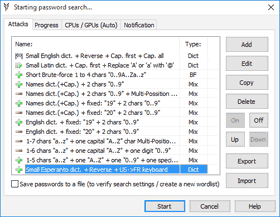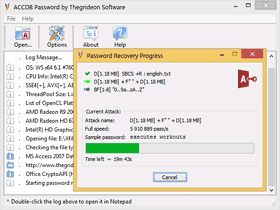ACCDB Password Recovery
ACCDB Password by Thegrideon Software is a feature-rich and highly-optimized password recovery tool for MS Access 2007 - 2024 & Office 365 databases (.accdb, .accde, ...). It works with all '.accdb' encryption methods: Agile (SHA + AES), CryptoAPI (SHA + RC4). Password recovery basics are covered in Password Search FAQ. You may also check other Access tools for data and VBA source recovery, mdb tools, etc.
ACCDB Password Recovery Features:
- All Access 2007-2024 and Office 365 encryption methods are supported.
- Several password search attacks can be configured and queued:

- advanced mixed attacks for precise search range setup:
- multi-position moves to cover modern password policies;
- simple modifications: add part(s) copy, replace chars, etc.
- typing errors, case switching, char substitutions;
- brute-force attacks based on a charset and length selected:
- limit number of equal, capital or special chars or digits;
- dictionary attacks with modifications (several wordlists are included):
- advanced keyboard layouts-aware recovery technique;
- password in reverse, capitalized, uppercased, lowercased;
- number ranges (e.g. 1-31, 01-12, 2013-2020, etc.);
- "Output attacks to a file" option to verify search settings, generate new wordlist, etc.
- Highly optimized code (SSE, AVX, AVX2, AVX-512) guarantees best performance.

- Utilizes NVIDIA and AMD Graphics processing units with a high-performance methods.
- Utilizes modern Intel integrated GPUs.

- Supports up to 64 simultaneous processing threads (multi-CPU, multi-GPU).
- Audio, script or web address based post-search notification.
- Windows 7 - Windows 11.
Encryption methods used in Access 2007 are not very strong by today standards and there is a way to replace database password with guarantee (please check Access 2007 Password), however there is no way to recover original password without exhaustive password search.If database password is as important as database content than ACCDB Password allows you to search through millions of passwords per second. Password verification methods used in MS Access 2010 - 2024 (and Office 365) are based on industry strong encryption and hashing algorithms (SHA-1, SHA-512, AES) and instant password recovery or decryption cannot be guaranteed in contrast to prior MS Access versions. Moreover recovery speed is limited due to iterative methods used in password verification. Taking this into account, ACCDB Password is not only equipped with highly optimized CPU and GPU code, but is also designed for precise search range setup. Several mixed attacks can be queued to exploit known password details (parts and patterns). More common dictionary and brute-force attacks with modifications are available as well.
We did our best to enhance this tool performance as well as the recovery speed with some advanced methods and it found to be the fastest tool for MS Access password recovery. Password recovery speed for very common hardware is available below to back this statement up.
| CPU only: |
|---|
| Access 2007: |
| Intel® Core™2 Duo T7500 @ 2.20GHz |
Intel® Core™ i3 2100 @ 3.10GHz |
Intel® Core™ i3 4130 @ 3.40GHz |
Intel® Core™ i7 2600 @ 3.40GHz |
|---|---|---|---|
| ~3 000 000 p/s | ~6 000 000 p/s | ~7 500 000 p/s | ~12 000 000 p/s |
Access 2010 - 2024:
The final password recovery speed is equal to CPUspeed + GPU(1)speed + ... + GPU(N)speed.
Access 2010 example: Intel i3 + integrated HD 4400 GPU + AMD R9 280X = 1 000 + 400 + 24 600 = ~26 000 p/s (passwords per second).
| CPU: |
|---|
| Instructions Set: |
| Access 2010: |
| 2013 - 2024: |
| Intel® Core™2 Duo T7500 @ 2.20GHz |
Intel® Core™ i3 2100 @ 3.10GHz |
Intel® Core™ i3 4130 @ 3.40GHz |
Amazon EC2 "c5.large" Xeon® Platinum core |
|---|---|---|---|
| SSE2 | AVX | AVX2 | AVX512 |
| ~230 p/s | ~475 p/s | ~1 050 p/s | ~1 200 p/s |
| ~30 p/s | ~60 p/s | ~135 p/s | ~210 p/s |
Integrated GPUs
Modern integrated GPUs (like Intel HD and Iris Graphics) can be used for password recovery acceleration. Integrated GPUs are not as powerful as dedicated (discrete) devices and often overlooked but can add up to 30% to CPU performance.
AMD and Nvidia GPUs
Compute units or stream multiprocessors (CU, SM, SMX, SMM) are the main building blocks of GPU calculation power, thus 32xCU GPU card is usually twice as fast as 16xCU GPU card of the same family and architecture running at the same frequency.
The table below shows expected performance per SM / CU for Nvidia and AMD GPUs as well as several actual examples.
| NVIDIA GPU: |
|---|
| Per SM at 1000 MHz |
| Tesla K80 (Kepler 2.0) 2x13xSMX, 820 MHz |
| Tesla V100 (Volta) 80xSM, 1380 Mhz |
| Access 2010: | 2013 - 2024: |
|---|---|
| 1000-1500 p/s | 150-200 p/s |
| 27 000 p/s 27000/26/0.82=1250 |
3 300 p/s 3300/26/0.82=155 |
| 120 000 p/s 120000/80/1.38=1090 |
18 000 p/s 18000/80/1.38=160 |
| AMD GPU: |
|---|
| Per CU at 1000MHz |
| R9 270 (GCN 1.0) 20xCU, 950 MHz |
| RX 480 (GCN 4.0) 36xCU, 1250 MHz |
| Access 2010: | 2013 - 2024: |
|---|---|
| 700-750 p/s | 100-150 p/s |
| 13 800 p/s 13800/20/0.95=725 |
2 400 p/s 2400/20/0.95=125 |
| 30 900 p/s 30900/36/1.25=690 |
5 100 p/s 5100/36/1.25=115 |
It is important to mention that AMD and NVIDIA architectures are quite different and although AMD per CU performance is lower, there are more CUs per card in a similar price range. Moreover GPU performance is somewhat variable with number of factors including GPU/CPU combination and even a driver version. Please contact us if your recovery speed is noticeably different from the data above.
Trial version is available to check format and hardware compatibility. It allows you to setup and test run any password search for up to 15 min per run. Recovered passwords are hidden behind the asterisks.
All trademarks are the property of their respective holders.


